 klaus-michael schneider
klaus-michael schneider
Keywords: education |
Links: FOTW homepage | search | disclaimer and copyright | write us | mirrors

Last modified: 2021-08-26 by  klaus-michael schneider
klaus-michael schneider
Keywords: education |
Links: FOTW homepage |
search |
disclaimer and copyright |
write us |
mirrors
See also:
 image by Ivan Sache, 16 August 2014
image by Ivan Sache, 16 August 2014
Institucion Educativa San Bartolomé (INESAB) was established on 28 October
1965 in Córdoba (Nariño Department) by the parish priest Remigio Nicolás Narváez
Benavides. Classes started on 25 December 1965.
The flag of the institute is white with the institute's emblem in the middle.
White is a symbol of purity and rectitude.
The emblem of the institute is made of three concentric circles. The central
circle features a torch pointing to the north. As a guide and source of light,
the torch is a symbol of truth, liberty and personal education guided by
perseverance, audacity and adventure. The torch is supported by the Bible, a
symbol of the search for truth. The middle circle is charged with a cross
symbolizing struggle, force, and spiritual triumph. Light emerges from the cross
of Christ, as the eternal light of transcendence, resurrection, and
redemption. The external circle is charged with the writing "HOC SIGNO VINCIS"
(should be "IN HOC SIGNO VINCES" / In This Sign You Will Conquer) and "STO VIR"
(Should be "ESTO VIR" / "Be a Man"), which form the essence of the institute's
philosophy. Red is a symbol of love, courage, and spiritual highness. Yellow is a
symbol of light and knowledge.
Source:
http://iesanbartolome2012.blogspot.fr/2012/11/quienes-somos.html -
Institute's website
Ivan Sache, 16 August 2014
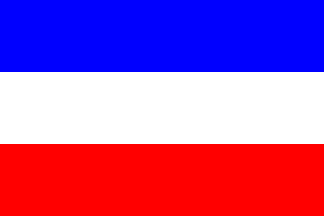 image by Ivan Sache, 07 July 2011
image by Ivan Sache, 07 July 2011
"Institución Educativa Colegio San Bartolomé" is located in San José de
Cúcuta (Cúcuta Department).
The flag of the institute, as shown on the institute's blog, is horizontally
divided blue-white-red.
Source:
http://colsanbartolome.blogspot.com/2009/08/escudo-del-colegio.html
Ivan Sache, 07 July 2011
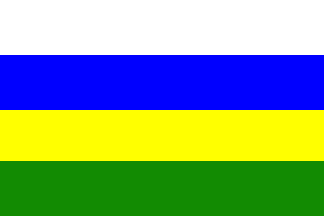 image by Ivan Sache, 3 January 2021
image by Ivan Sache, 3 January 2021
Colegio San Benito was established in borough San Benito, La Candelaria,
Medellín, by Resolution No. 14,311 issued on 24 December 2014.
The flag
of Colegio San Benito is horizontally divided white-blue-yellow-green.
White
is an achromatic color, of maximum brightness and null darkness. It symbolizes
light, kindness, innocence, purity and peace. White is considered as the color
of perfection, also meaning security, purity, faith and limpidity.
Blue is a
symbol of deepness, coldness, stability, seriousness, confidence, faith and
eternity. It is called the color of all colors, especially for tranquility and
calm it conveys. In contrast with yellow, blue supplies freshness.
Yellow is
connected with two transcendent elements, the sun, source of life, and gold. It
is considered as the symbol of wealth. It symbolizes intelligence, energy and
felicity. Associated with the sun, yellow conveys a sense of energy and glee.
The emotional effects of yellow are optimist and bright. Combined with green,
yellow suggests natural freshness; combined with blue, it creates a sense of
limpidity while combination with white slightly attenuates its brightness.
Green, evokes the natural environment and symbolizes harmony, growth, fertility
and freshness. Emotionally, green symbolizes security. In heraldry, it
represents belief and hope. Olive green is connected with peace, via the olive
branch.
http://sanbenito.edu.co
School website
Ivan Sache, 3 January 2021
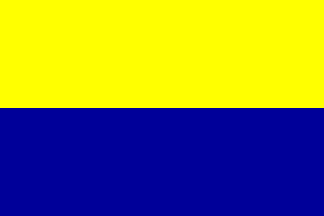 image by Ivan Sache, 26 July 2014
image by Ivan Sache, 26 July 2014
Colegio San Benito de Tibatí was established in Bogotá by the Order of Saint
Benedict (Benedictines). On 6 August 1960, Luis Concha Córdoba, Archbishop of
Bogotá, welcomed four monks - Lawrence Wagner, Frederic Mundt, Anselm Ruelle and
Adrian Mundt - from the abbey of the Assumption, Richardton, North Dakota (US).
They were invited by the archbishop to contribute to the improvement of Catholic
education in Bogotá. The four monks established Colegio San Carlos, where
classes started in February 1961. On 15 September 1963, the foundation of the
priorate of Tibatí was approved. The priorate was named for a Chibcha word
meaning "Joy of the Lord". In February 1969, the priorate was allowed to teach
novices. Under the guidance of Father Valeriano Oldermann, the monks of Tibatí
purchased the plots surrounding Colegio San Carlos and established Colegio San
Benito de Tibatí. Classes started on 12 February 1979.
The flag of the institute is horizontally divided yellow-dark blue. Yellow is a
symbol of valour and spiritual force, of equity and felicity, and of joy
and common life in harmony. Blue is a symbol of academic skills, magnanimity,
and truth.
Source:
http://www.csbt.edu.co/Simbolos_Institucionales_CSBT.php - Institute's
website
Ivan Sache, 26 July 2014
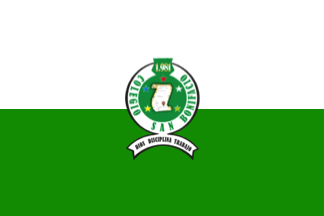 image by Ivan Sache, 3 January 2021
image by Ivan Sache, 3 January 2021
Colegio San Bonifacio was established on 10 March 1981 in Bogotá by Ligia
Celmira Abril and Luis Alfredo Torres.
The flag of Colegio San Bonifacio
is horizontally divided white-green with the school's emblem in the center.
Photos
https://colegiosanbonifacio.edu.co/uncategorized/posesion-personero-2020
Ivan Sache,
3 January 2021
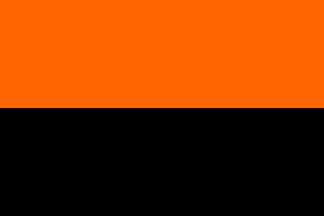 image by Ivan Sache, 6 February 2010
image by Ivan Sache, 6 February 2010
Flag of Universidad de San Buenaventura is based on <www.usb.edu.co>.
Dov Gutterman, 3 June 2001
The flag is horizontally divided orange-black. The website
says that orange stands for youth, creativeness and intelligence,
and black for sobriety, rigour and academic excellence.
Ivan Sache, 3 June 2001
Colegio de San Buenaventura was founded at the end of the 17th
century in Santa Fé de Bogotá by the Franciscan Order; on 5
November 1861, Tomás Cipriano de Mosquera ordered the
suppression of all the religious communities from the national
territory and closed the old college. Universidad de San
Buenaventura (USB) was refounded on 14 June 1961 in Bogotá (main
seat), sections being subsequently founded in Medellín (1966),
Cali (1970) and Cartagena (1994).
Source: USB
website.
Photos of the flag: Bogotá
- USB main seat, Medellín
section, Cartagena
section (Album "Auditorio", picture #10 and last).
The university's website shows a drawing
of the flag charged with the university's seal in the middle,
which is not supported either by the description of the flag or
photographical evidence.
Ivan Sache, 6 February 2010
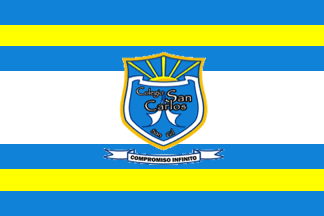 image by Ivan Sache, 12 December 2020
image by Ivan Sache, 12 December 2020
Colegio San Carlos was established in San Gil (Santander) by Municipal
Agreement No. 25 issued on 27 August 2002, succeeding Colegio Seminario San
Carlos, which had been established in 1972 following a convention signed by the
Colombian Government and the Colombian Episcopal Conference. The old Seminario
Menor Conciliar San Carlos Borromeo of the Diocese of Socorro and San Gil had
been established by Resolution No. 5,977 issued on 11 December 1958.
http://colsancarlossangil.edu.co/
School website
The flag of Colegio San Carlos is horizontally divided
blue-yellow-blue-white-blue-yellow-blue (1:1:1:3:1:1:1), with the scroll's
emblem in the center.
http://colsancarlossangil.edu.co/index.php/page/item/31
School website
The Spanish motto reads "Compromiso Infinito", "Infinite Compromise".
Ivan Sache, 12 December 2020
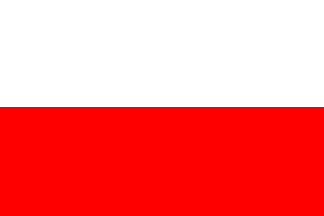 image by Ivan Sache, 1 January 2021
image by Ivan Sache, 1 January 2021
Gimnasio Moderno San Carlos is located in Mosquera (Cundinamarca).
The
flag of Gimnasio Moderno San Carlos is horizontally divided white-red.
White
represent the children's purity, tolerance and virtues.
Cherry red represents
the institute's love, force and commitment to quality to reach excellence.
https://www.gimnasiomodernosancarlos.edu.co/representacion
School
website
Ivan Sache, 1 January 2021
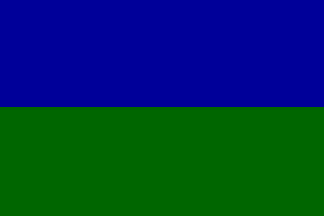 image by Ivan Sache, 04 August 2014
image by Ivan Sache, 04 August 2014
Liceo San Carlos is located in Cajica (Cundinamarca Department).
The flag of the institute is horizontally divided blue-green.
Source:
http://liceosancarlos.edu.co/emblemas.html - Institute's website
Ivan Sache, 04 August 2014
 image by Ivan Sache, 06 August 2014
image by Ivan Sache, 06 August 2014
Institución Educativa San Cristóbal was established in April 1966 in Medellín
(Antioquia Department).
The flag of the institute is horizontally divided red-green with the institute's
emblem in the middle. Red is a symbol of love, optimism, cooperation, and
harmony. Green is a symbol of faith, projection, hope, admiration, and love for
the natural environment.
The emblem of the institute shows on a white background a book symbolizing
science and aspiration to learn. The cover of the book is diagonally divided
into two parts coloured like the flag. The book supports a torch hold by two
hands, meaning union, integration, fraternity, and aspiration to surpassing.
Beneath the books is the writing "CIENCIA Y DEMOCRACIA" (Science and Democracy)
in bold black letters, surmounting the writing "ECOLOGÍA - ÉTICA - TRABAJO"
(Ecology - Ethics - Work) forming an arch. The whole is inscribed in a green
ring. The outer border of the emblem, limited by a red ring, is inscribed on top
with the institute's name, "I.E. SAN CRISTÓBAL" and on bottom with "LIDERANDO
PROCESOS DE CRECIMENTO HUMANO" (Leading the Processes of Human Growth).
Source:
http://www.iesancristobal.edu.co/index2.php?id=4151&idmenutipo=734&tag= -
Institute's website
Ivan Sache, 06 August 2014
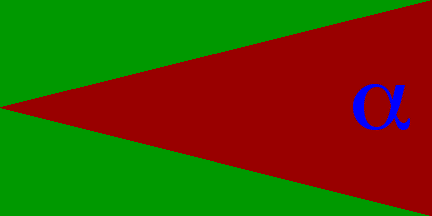 image by Ivan Sache, 16 December 2008
image by Ivan Sache, 16 December 2008
"Colegio Campestre San Diego" was founded in Chia on
12 February 1994, succeeding the "Liceo San Diego" of
Bogotá.
The flag of the institute, as shown graphically and described on
the institute's
website, is dark red with two right-angle triangles placed
along the hoist and a blue Greek letter "alpha" near
the hoist. The triangles form a wide perspective on which is
projected the "alpha" symbol.
The colours suggest that the power of love (red wine red) and the
depth of life, shown in the sky and the sea (blue), converge at
the infinite and feed the permanent retroalimentation of hope and
empathy with the natural environment (green).
Ivan Sache, 16 December 2008